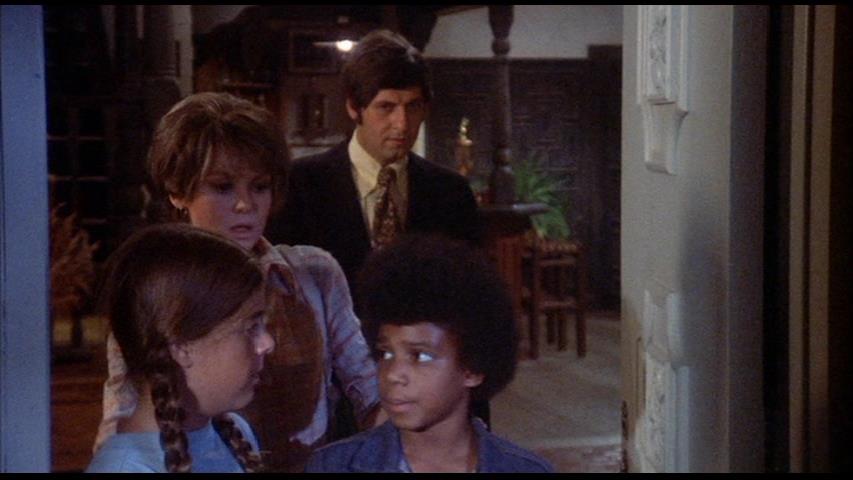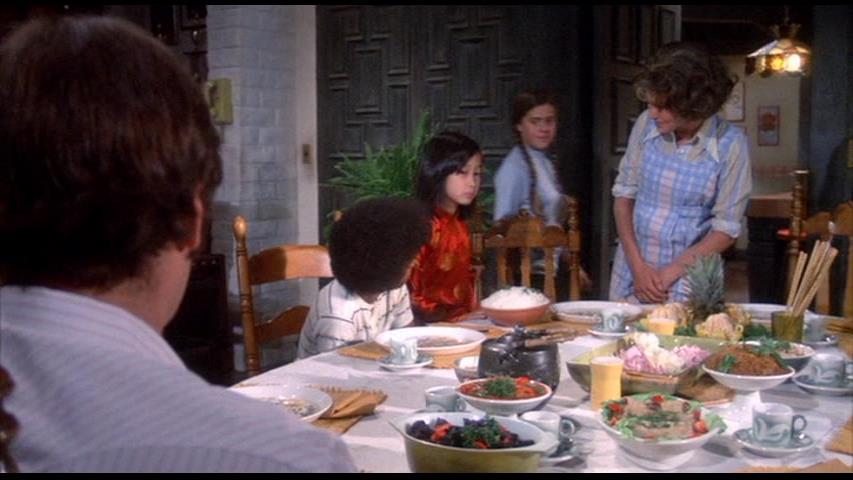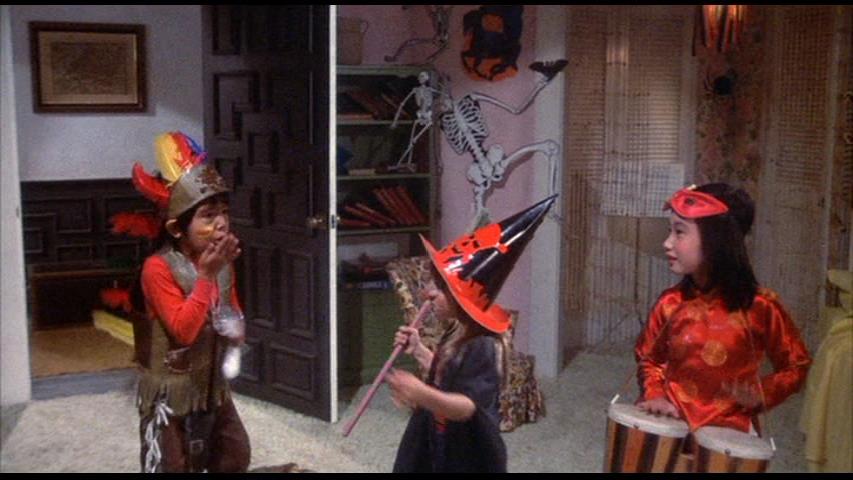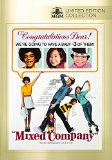| Reviews & Columns |
|
Reviews DVD TV on DVD Blu-ray 4K UHD International DVDs In Theaters Reviews by Studio Video Games Features Collector Series DVDs Easter Egg Database Interviews DVD Talk Radio Feature Articles Columns Anime Talk DVD Savant Horror DVDs The M.O.D. Squad Art House HD Talk Silent DVD
|
DVD Talk Forum |
|
|
| Resources |
|
DVD Price Search Customer Service #'s RCE Info Links |
|
Columns
|
|
|
Mixed Company
MGM's DVD-R "Limited Edition Collection" (by way of 20th Century Fox's similar program) brings us yet another underseen movie from the 1970s. 1974's Mixed Company is a true artifact of its time, before "political correctness" was on many people's minds. Joseph Bologna is Pete Morrison and Barbara Harris is his wife Kathy, a typical early-70s family in Phoenix with three kids and trying for a fourth. The kids are more for Kathy however, as Pete spends a lot of time away from the family since he is coach of the Phoenix Suns (who have been on a losing streak to add even more to his stress.) A visit to the doctor brings the news that they in fact won't medically be able to have another child.
But Kathy volunteers at a foster home and gets an idea. In the movie's opening scene with a presentation to potential child adopters (which in itself quite shows the time this movie was made), the leader Marge (Dorothy Shay) explains "with the pill and legal abortions, the unwanted baby has practically disappeared in this country" and with that came fewer adoptable children altogether. Marge says "we're fresh out of little blond angels" and those who want to adopt will not just have to settle for an older child, but also one of a different race. (To this an astonished woman replies "I'm not sure I could learn to love a child that's a different race than my own." This is just one of many lines in the movie that might have viewers in the year 2015 and later doing a double-take.) One night, right before Dad heads off to coach the basketball game while the rest of the family goes to watch, Marge shows up with a potential new addition: Freddie (Haywood Nelson, who went on to play Dwayne on the sitcom "What's Happening!!") who is not only twelve years old but also black. Right away Pete calls him a "spade" (I guess there were worse things he could have called him) and asks if he's on "Candid Camera." But Freddie is only there on a six-month trial; if either he or the family decide things aren't working out in that amount of time, he can go back to the foster home.

While the all-white neighbors at first stare at Freddie in disbelief (and next-door Al, played by Tom Bosley in a bit part, offers the family money to move out as he feels the family is lowering the neighborhood's property values), at school the teacher shows a little too much sympathy for him being the only non-white kid in class and takes it easy on him, including relieving him of the burden of homework she assigns to the other students. This makes Kathy afraid that Freddie will get used to having things "handed to him" and, because this movie is full of irrationality, decides the solution is to adopt another child of a different race, this time a Vietnamese girl named Quan (Jina Tan), whom she surprises her husband with at a picnic in the park. Quan also comes with a bonus: young Joe (Stephen Honanie), an American Indian (the term "Native American" isn't uttered a single time here.) Joe is so attached to Quan at the foster home that Kathy simply can't refuse to take him as well.
With the main joke of the film fully established here, the rest is ripe for situations that poke a bit of fun at and challenge the 1974 audience to question racial prejudices and stereotypes. For Quan's first dinner at home Kathy serves traditional Vietnamese food, but this upsets her and makes her run upstairs. For Halloween, Joe has fun dressing up in stereotypical Indian garb and stereotypically "whoop"ing. Freddie seems to be the most level-headed person in the house but he's not too happy about it, and oldest daughter Liz (Lisa Gerritsen) becomes more racially open in a way that shocks her parents, and likely the audience of the time (but will most likely make today's audience laugh or even applaud.)
Reviews I've looked up from Mixed Company's release suggest that it wasn't well-liked at the time, but this is certainly one of those movies that gets more entertaining the older it gets. Besides tackling racial issues, it appears that co-writer and director Melville Shavelson (who previously brought two families of "children from a previous marriage" together in 1968's Yours, Mine and Ours which then inspired "The Brady Bunch") had a bit too much fun with the new-at-the-time freedom of adding some foul language and having the children say "damn" a few times. The character of the father Pete at first seems a bit too cruel as he practically ignores his present family and is completely against adopting any other children let alone those of different races, then inexplicably shifts gears as the movie progresses. While it would have made sense to depict the character of Kathy as progressive and intelligent, Barbara Harris plays her mostly with the same ditzyness as she did as the girl-in-the-mother's-body in 1976's Freaky Friday. The couple's three natural children seem mostly one-dimensional, but all of these performances could have been the movie's intent.

The standard-def DVD is presented at about 1.85 widescreen from a reasonably clean print. The picture seems intentionally soft and grainy, with colors that don't stand out at all. Some of the movie's production limitations are obvious during scenes where the family attends basketball games, as some stock footage from actual games is shown followed by scenes shot just for the movie with a different balance of color and obviously not as many people in the seats.
As this movie was released by United Artists, their annoying tradition which dates back to the early days of home video continues here as the original studio opening (which included the "A Transamerica Company" byline) that plays over the opening music is replaced with the current UA logo with its website byline, something that certainly didn't exist in 1974. Another nit-pick I should mention is that like the other DVD-R titles from MGM and Fox, chapters are placed every ten minutes rather than at selected scenes.
SoundThe mono audio is encoded in 2-channel Dolby Digital and is mostly acceptable although a bit muddy. Sound for this type of movie simply was not a high priority in the 1970s.

Mixed Company is another one of those movies remembered by some from years ago but hasn't been available for purchase until now. It will certainly be looked at differently now than it was in 1974, and I would dare to call it an essential title for any 1970s film collection despite its faults.
Jesse Skeen is a life-long obsessive media collector (with an unhealthy preoccupation with obsolete and failed formats) and former theater film projectionist. He enjoys watching movies and strives for presenting them perfectly, but lacks the talent to make his own.
|
| Popular Reviews |
| Sponsored Links |
|
|
| Sponsored Links |
|
|
| Release List | Reviews | Shop | Newsletter | Forum | DVD Giveaways | Blu-Ray | Advertise |
|
Copyright 2024 DVDTalk.com All Rights Reserved. Legal Info, Privacy Policy, Terms of Use,
Manage Preferences,
Your Privacy Choices | |||||||













